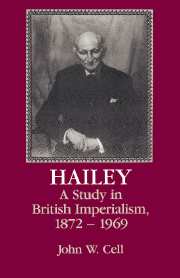Book contents
- Frontmatter
- Contents
- List of abbreviations
- Glossary of foreign words
- Preface
- 1 Early life
- 2 Colonization officer, 1901–1906
- 3 From Sargodha to Delhi, 1907–1912
- 4 Chief commissioner of Delhi, 1912–1918
- 5 A report on the Punjab
- 6 Finance member, 1919–1922
- 7 Home member, 1922–1924
- 8 Governor of the Punjab: the Sikhs, 1924–1925
- 9 Governor of the Punjab: the communal problem, 1924–1926
- 10 Governor of the Punjab: the communal problem, 1927–1928
- 11 Governor of the United Provinces, 1928–1930
- 12 Governor of the United Provinces: civil disobedience and Round Table Conference, 1930–1931
- 13 Governor of the United Provinces: 1931, year of crisis
- 14 Governor of the United Provinces: winding down, 1932–1934
- 15 Surveyor of Africa, 1935–1939
- 16 Two missions to Africa, 1939–1940
- 17 A report and a vision, 1941–1942
- 18 Adviser and propagandist, 1942–1945
- 19 Indian partition and the onset of African decolonization, 1945–1949
- 20 Defender of the faith, 1949–1969
- Bibliography
- Index
20 - Defender of the faith, 1949–1969
Published online by Cambridge University Press: 12 October 2009
- Frontmatter
- Contents
- List of abbreviations
- Glossary of foreign words
- Preface
- 1 Early life
- 2 Colonization officer, 1901–1906
- 3 From Sargodha to Delhi, 1907–1912
- 4 Chief commissioner of Delhi, 1912–1918
- 5 A report on the Punjab
- 6 Finance member, 1919–1922
- 7 Home member, 1922–1924
- 8 Governor of the Punjab: the Sikhs, 1924–1925
- 9 Governor of the Punjab: the communal problem, 1924–1926
- 10 Governor of the Punjab: the communal problem, 1927–1928
- 11 Governor of the United Provinces, 1928–1930
- 12 Governor of the United Provinces: civil disobedience and Round Table Conference, 1930–1931
- 13 Governor of the United Provinces: 1931, year of crisis
- 14 Governor of the United Provinces: winding down, 1932–1934
- 15 Surveyor of Africa, 1935–1939
- 16 Two missions to Africa, 1939–1940
- 17 A report and a vision, 1941–1942
- 18 Adviser and propagandist, 1942–1945
- 19 Indian partition and the onset of African decolonization, 1945–1949
- 20 Defender of the faith, 1949–1969
- Bibliography
- Index
Summary
Lord Hailey is often said to have had two careers, more or less equal in weight, and of the two the African phase is actually the better known. That however is a severe distortion. He spent comparatively little time in Africa: apart from winters in South Africa when he was in his high eighties, there were five months in 1936, eight in the two missions of 1940, another two touring and writing the report for General Smuts on South-West Africa, and a final six in 1947–8 preparing to revise the native administration report. As has been shown, although he planned and launched it he wrote very little of the Survey. Moreover, because he spent the entire year before publication recovering from a life-threatening breakdown, his contributions as an editor were far less extensive than has usually been supposed. Even the conclusions he saw for the first time in galley proofs.
What has been called Hailey's period of ascendancy, when he was playing a significant role in policymaking, was actually surprisingly short, effectively beginning with the publication of the African Survey in 1938 and virtually ending with Oliver Stanley's terse note in the spring of 1943. During the immediate postwar era, with Labour in power, his influence somewhat resurged. After the late 1940s, however, although he presided over the revision of the Survey and continued to write, speak, and chair committees, he no longer possessed even quasi-official status and was rarely consulted.
- Type
- Chapter
- Information
- HaileyA Study in British Imperialism, 1872–1969, pp. 295 - 305Publisher: Cambridge University PressPrint publication year: 1992



